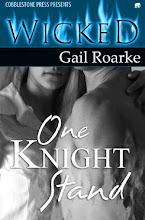Welcome to another weekly post in the How I Write series. This series of posts is the brainchild of Ansha Kotyk, who--along with the other participants, including Yours Truly--haunts the forums (registration required) of the Romance Divas website. You can go
here to find a list of all the participants with links to their individual blog posts. We'll each be posting on the same topic each Wednesday for the next two or three months--longer, if it goes well and we're having fun with it.
This week's topic is Revisions--First Pass, Resources, Critique Groups
Well...I'm not sure that I have a lot to say this week, to be honest. I said most of it last week. Revision is my least favorite, least time-consuming part of writing. Based on how some of the other participants described their writing technique, I suppose one might say I do a lot of my revisions while I hammer out the first draft.
I don't think of it as revision, though. It's all part of the mysterious, mostly subconsciously-driven, seat-of-my-pants approach to writing that I employ. I begin at the beginning, and write until I reach the end, then stop. Of course, along the way I may add or delete scenes, cut and paste scenes so the arrangement works better, or go back and modify scenes to suit changes I've wrought since I first put it down on "paper". I suppose one might call that revising, but I've always thought of it as simply part of the process of writing.
Thus, when I'm done with my first draft, it's relatively clean. The revisions are minimal at that point, and involve much cleaning up of typos, dropped or extraneous words, and smoothing out the rough edges of text being composed on the fly. And spell-checking, of course. I run the computer's spellchecker--but only
after I'm done with the writing. I never, ever, ever allow the computer to spellcheck (or worse, grammar check) me when I'm writing.
And I never rely solely on the spellcheck. Software guys can't spell for beans. Many a spellchecker is as likely to introduce errors as eliminate them. Besides, there are too many errors a spellcheck program won't catch: homynyms, of course, and words that aren't the word you meant to write but which
are at least spelled correctly. I'm never done revising until I've printed the story out and read it through line by line with red pen in hand. It's amazing--and a little alarming--how many errors I always catch that way.
I briefly mentioned critique groups last time. I'm in one, but they've met maybe twice since joined them. And even if we met regularly, I wouldn't depend on them to critique my work. I never show anyone--not my critique group, not my spouse--a work in progress.
Nobody sees it until it's finished because it's
my story; it'll be the best story I can produce at the time. I will only show my work to them after it's finished (and in the mail to an editor who can buy it--Heinlein's Rules again). Then they serve as another audience. I'm interested to hear what they have to say, but any valid criticisms I get will be applied to the
next story. Once a story is done, it's done.
I suppose all of that might sound arrogant, but that's not my intention. It's just that I work best when I simply write the best story I can produce all on my own. I don't want to write by committee, or to please a committee, or for the approval of a handful of individuals--all of which can happen all too easily with critique groups. Plus, even if your critique group is full of established, published writers, they are still giving you their personal opinions, based on (among other things) their personal tastes. And if I'm going to ask someone's opinion of the story, why not an editor? If he likes it, he'll not only tell me so, he'll give me money! Does your critique group do that? Mine doesn't.
So my stories go to editors first,
then to other people, whose opinions I respect. I'll listen to their criticisms, and heed their advice (if I think it's valid). But I won't revise a story once it's finished. That ship has sailed. I will, instead, apply the advice to my future stories, which--given both my greater experience as a writer (by a minimum of one additional tale) and informed criticism, is likely to be better overall than a story I might revise after the fact.
In fact, I may soon redraft (i.e., rewrite from scratch--not revise) a story I've had in circulation for over a year now. I've gotten some good and useful feedback on it, and I can see the validity of the comments I've received from some editors who rejected it. It won't be a revision of the original story. It will be a
new story based on the same premise, with some of the same characters, but told anew--with (I sincerely hope) more skill and better craft than the one I wrote a year ago. (I won't pull the old story from circulation, mind you. Heinlein's Rule # 5--keep the story in the mail until someone buys it. It may yet find a home someday. But there's no reason I can't take another bite at the apple.)








I really like your use of Heinlein's rules. It gives me some perspective on my own revision process. My drafts are very messy and I'm still learning so my critique group is excellent for feedback on what is working and not working. And we're aware of our own opinions and slants so it works for us. The entire process is truly unique to each person.
ReplyDeleteYes, Heinlein's Rules are my mantra. Following them doesn't guarantee success--but not following them will almost guarantee failure.
ReplyDeleteThey're the perfect antidote to a lot of the ways fear (of failure, criticism, or even success) can sabotage your efforts to become a selling writer. Follow them consistently and you take most of the tools out of fear's hands.
Like you I don't belong to a critique group. I prefer to work on a book on my own. Once it's finished I'll send it to one of my trusted beta readers. Once I get their feedback, sometimes I'll make changes while other times I'll go with gut instinct and leave my story as it stands. I think each writer has a process that works for them. Polishing isn't my favorite part either, but I'm stuck doing it at the moment, neverthe less! It's part of our writing job.
ReplyDelete